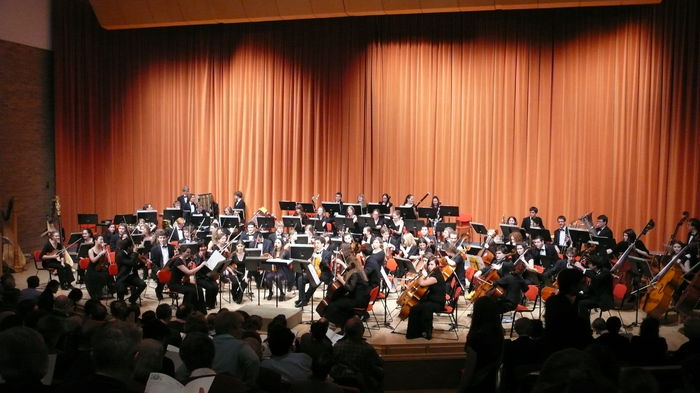The BBC Proms show that classical music is here to stay
After attending ‘Prom 63: The Rite by Heart’, Chiara Delpiano Cordeiro is confident that classical music can survive another generation

After spending most of the summer in Cambridge, a sad realisation dawned on me: I hadn’t been to any of the BBC proms this year at the Royal Albert Hall. Usually, they are my one opportunity to attend classical music concerts at short notice and for an affordable price. Seeing as I had to go on the weekend, my choice was between ‘Les Troyens’ (The Trojans, a four-hour grand opera by Berlioz) or Stravinsky’s ‘The Rite of Spring’, Braving the train strikes, a friend and I ended up at ‘Prom 63: The Rite by Heart’, featuring the Aurora Orchestra.
Looking around the audience, there were people wearing everything from full-on white tie to brightly coloured shorts and T-shirts, across a whole range of ages. Based on the conversations I overheard, some of them attended these sorts of events religiously while others had never been to a classical music concert – a delightfully varied demographic.
“There were people wearing everything from full-on white tie to brightly coloured shorts and T-shirts”
‘Prom 63’, in particular, aimed to be accessible to anyone by providing the historical context of the piece without being patronising – a difficult balance, but one achieved well. The start of the concert featured a narration of the creative process of composing ‘The Rite of Spring’, including letters, music and descriptions of the ballet that brought the historical figures to life. The lighting and projections used were highly effective, illustrating the correspondence between the composer and his collaborators, as well as effectively conveying the ballet’s reception at the time. Fun historical facts were sprinkled throughout. For example, the piece was compared to Chopin’s ‘Les Sylphides’, which was performed immediately before the premiere.
The use of flexible staging, with the narrators and orchestra changing positions throughout the concert, was very liberating, making the concert an exciting and unexpected viewing experience. I can safely say that I had never been to a classical music concert quite like this one, with the unstructured freedom of a standing orchestra and their closeness to the conductors, where the topology of the staging changed every few minutes. It felt more like a play, with moveable boxes as a stage, rather than a concert, and the unconventionality of it was very refreshing!
“The unconventionality of it all was very refreshing”
One common criticism of classical music, and particularly its contemporary variety, is that it is elitist and inaccessible or “just plain boring”. However, no-one could make this case for ‘Prom 63’. The audience were enraptured as the orchestra gradually built up complex melodies and the narrators identified how folk tunes were adapted for the piece, pointing out the different rhythms and encouraging audience participation in clapping along.
One of the main joys of playing a challenging piece with an orchestra is the chance to get to know it intimately, recognising its evolving melodies and knowing what will happen next. This understanding greatly adds to the player’s enjoyment of the piece. By introducing parts of ‘The Rite of Spring’ before the full performance, the Aurora Orchestra enabled the audience to share this experience. This was made possible by the orchestra having memorised the piece, freeing them from the restrictions of having to read music while performing.
Whenever I mention that I regularly attend classical music concerts and art exhibitions, I always get a surprised reaction, particularly from non-Londoners. Given the decline of arts funding in state schools, this perhaps isn’t surprising. In 2021, only around 40% of students at London’s main conservatoires (the Royal College of Music and Royal Academy of Music) were state-educated, a shockingly low number.
Even the BBC is facing issues with arts funding, with the BBC Singers narrowly escaping closure thanks to public outrage. This raises the question: will classical music still be around in 20 years and not just confined to a narrow audience? If children don’t get opportunities to experience classical music at school, is it too late for them to ever appreciate the artform? Glancing around the hall at the families surrounding me, it looks like classical music is here to stay - as long as the Proms continue to play their vital role of introducing classical music to younger generations.
‘Prom 63’, moreover, was a particularly incredible experience. After the main performance of ‘The Rite of Spring’, there was an encore, with performers mixed in among the audience. In the words of the man two seats along from me, it was “f**king amazing”.
The Proms are an easy way for anyone to experience classical music for the first time. However, for those who want to go further, there is always the option of joining a choir or an orchestra. It’s never too late to start learning an instrument and there are plenty of opportunities for beginners, many of which can be found on the CMP website or through individual college music societies.
 Comment / Cambridge is right to scrap its state school target1 May 2024
Comment / Cambridge is right to scrap its state school target1 May 2024 News / Academics call for Cambridge to drop investigation into ‘race realist’ fellow2 May 2024
News / Academics call for Cambridge to drop investigation into ‘race realist’ fellow2 May 2024 Sport / The diary of a Bumps rower24 April 2024
Sport / The diary of a Bumps rower24 April 2024 Features / Will May Balls ever be sustainable?30 April 2024
Features / Will May Balls ever be sustainable?30 April 2024 News / Emmanuel College cuts ties with ‘race-realist’ fellow19 April 2024
News / Emmanuel College cuts ties with ‘race-realist’ fellow19 April 2024





